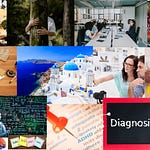When I was sixteen or seventeen, my mother had to be hospitalized for several days while her doctor ran some tests. When her internists came in to see her, I was there. He saw me and began chatting; I playfully tried to grab his medical bag. He turned to my mother with a smile, and I stopped my horseplay. I heard her say, and I'd never heard her use the expression before, "this is my brainchild." I wasn't sure what that term meant, but it sounded endearing and special. I had not heard her use that before, and I didn't remember her using that to describe my brothers, which I thought was great as I was the youngest of four brothers. It made me feel special, especially as my mother had said it with such love, warmth, and maybe even a little pride. She was a lovely and generous person with the warmth and sincerity that everyone felt. When I got behind, struggled, or worked extra hard to do well in school, she would offer encouragement or a helping hand, as I remember with one of my science fair projects. I was thinking about my future and perhaps maybe considering medicine, but I thought it out of my grasp.
The expression brainchild occurred to me again as my son had some challenges with the normative ways of traditional school education with exceptional abilities to reason on complex matters and develop novel solutions to problems. I never thought about Mother's brainchild endearment for me too much after that, and I don't recall it coming up again. I realize my son carried some unique traits and learning styles, similar to myself and many of my family members. The inherited characteristics seem to have benefits but also make certain things more challenging. I think my mother as myself, my son, and other family members have these information and language processing attributes.
Neuroscientists and specialists in these areas have tried to separate these traits and characteristics with notable names and labels. Their use, perhaps, is helpful when significant impairment is present but also imparts a signifier with negative connotations for the individual. Unfortunately, the designating label can also become a weapon for discrimination and condescension. Of course, there is some value in recognizing traits that might be problematic later in life, so training and some remediation can occur early in life where there is a chance for lasting improvement.
Diversions, distractions, and taking longer can be essential for the talented, problem-solving mind. Sometimes these attributes are ascribed to a person being more left-brained dominant or highly intelligent on the autism spectrum.
As there can be so much variability in genetic traits and expression, naming and labeling might be more helpful when advanced genetic testing is available to designate unique differences and variability of behavior, learning, and information processing. The term spectrum or neurodiversity is an expression to denote the significant variability one might see in everyone rather than trying to reduce a person to a specific label. However, there is value in targeting and defining difficulties that may benefit from special training, treatment, or in some situations, medication, or cognitive-behavioral therapy, as with attentional problems. When there are difficulties with adaptive or social skills in early childhood, interventions can bring lasting benefits.
Brainchild is a metaphorical expression for a novel, original, or innovative outcome or production from a creative idea or concept. My mother, at least once when I was young, bestowed on me the blessing or admiration as her brainchild. I realized this was fitting, perhaps for myself and other family members. I told my son the story about my mother, and with loving admiration, I told him he was my brainchild.
When I heard this from my mother, I took it in as an endearing expression she bestowed on me. Unique language and information processing can appear in different degrees from individual to individual, for better or worse, as in my family. I had an older brother who was more severely affected by language and information-processing difficulties but could support himself with a good job for many years with a wife and children. He had a challenging time in school and often had to have a lot of tutoring and help to graduate. He also had to endure a lot of discrimination and bullying because of his unique way of figuring out and doing things.
Artificial Intelligence
Today's big thing of interest is the advances in artificial intelligence and Chat GPT. Chat GPT is the brainchild of innovators and Tech Wizards. Still, its very construction brings a technology that gathers and assembles much information from the internet, often lacking context, perspective, and accuracy. In its early inceptions, the internet developed by innovative thinking and problem-solving of a group of tech whizzes who I would suspect were on the brainy high, functioning side, the brainchildren of their parents. They had the brilliance and ability to develop many remarkable developments in computer technology and artificial intelligence. People with those fantastic talents had an exceptional ability to absorb a significant quantity of information and then weave all the data into a pattern that became the novel solutions that became the framework of computers and the internet, and now Chat GPT.
The right and left-brain collaboration or not
The comparison of right and left-brain function or the highly specialized parts of the brain, connected by rapidly communicating nerve channels, is often debated in neuroscience. The brain's left hemisphere is associated with logical, analytical thinking, reasoning, and language processing. It is also involved in tasks that require attention to detail and the ability to sequence and organize information. In contrast, the brain's right hemisphere is often associated with spatial reasoning, creativity, and visual processing. It is also involved in tasks that require recognizing patterns and relationships and integrating information from multiple sources. There is a collaboration between different specialized brain areas to manage vital operations such as language processing and vision. Because of the specialization of brain regions, there may be more activity and contribution from one place during a particular task than another in carrying out any needed neural function.
In popular psychology, left-brain people are characterized as being more logical, linear thinking, analytical, quantitative, systematic, detail-oriented, verbal, orderly, digital, and better at things like reading, writing, computation, sequencing, mathematics, recall of facts, and thinking in words. Right-brain dominant people have been characterized as being more creative, imaginative, holistic, intuitive, rhythmic, musical, and aware of nonverbal cues such as facial expressions. The influence for this representation came from some of the earlier theories that the brain's two hemispheres have different unique functions, as found in the research of psychobiologist Roger W. Sperry in the 1960s.
The suggested dichotomy between the two sides of the brain is an oversimplification. The differences are not absolute, as both hemispheres of the brain work together in a complex integrative manner to carry out cognitive processes. The expression that an individual is left-brained or right-brained is used to simplify and metaphorically represent what is considered the more dominating function of each side of the brain to describe the characteristic often thought to be based in one half of the brain or the other. Instead, both the brain's hemispheres or specialized areas in both are interconnected and work together in a highly sophisticated manner to support a wide range of cognitive (intellectual and thinking) functions. So, the expression of being more left brain might be applied, for example, to one who is felt by others to be more "brainy" or intellectual but inept in social matters, as the expression "nerdy," or to someone on the high intellectual functioning side of the autism spectrum.
I apologize if the expressions I use related to neuroscience bring confusion. It may be that the subject is difficult for most of us, excuse the pun, "to wrap our brains around." Iain Gilchrist's book, The Master and his Emissary, explores this more deeply, especially in the context of philosophy, neuroscience, and the arts.
So, I'm not exactly sure what my mother meant by proudly calling me her brainchild, but I hope it was a loving reflection of me being special to her.
Unique brain functioning and solving complex problems
Individuals with exceptional talent, ability, and capacity to gather, pattern, and keep large amounts of information accomplish this in the specialized part of the brain that developed to do so. However, sometimes, and maybe often, the accomplishment is done at the expense of consistent, integrated communications between other brain parts. For a brain system to successfully process and accumulate more significant amounts of information for more complex and novel patterns of problems solving or actions, it needs to be more independent of other information-contributing parts of the brain. These different areas must be inhibited, if not already done by genetics or injury, to block the continuous inflow of moment-to-moment distracting information from other specialized parts of the brain. The dynamic of not having as much new relevant information available interferes with the entry of the information that would add contextual and relational context to the current held data.
Operating without interference with the usually contributory brain areas allows more focus and concentration on assembling a task. Sometimes a person with the talent and capacity to abstract, remember large amounts of information, and construct all of it into a practical application, can get stuck in building an innovative, actionable concept. These specialized brain areas capable of excellent problem solving can require other ways of gaining perspective and new ideas to complete their formulations when their usual partners in its brain work are inhibited or unavailable.
Other strategies and operations are needed to achieve contextual and supportive information to complete the task and gain the elements that usually come from the different contributing brain areas. When caught in incompleteness, the specialized data configuring brain area felt to be more in the left-brain region must use other workarounds to get its job done. The over-focused left brain must go astray to get out of a quagmire when more perspective and contextual information is needed that may be gained from a diversion. Diversion may be a way to pick up and gain perspective so work can continue toward pattern construction and a solution. The diversion could be anything from watching a movie, reading more research information, walking in nature, or interacting with others. Unfortunately, this type of brain operation and the workaround are time-consuming and isolating for the person from social interactions.
Someone can be superb and exceptional in their intellectual functioning but lack other qualities from the loss of coordination with other brain areas that may cause social ineptness. So, even with great intellectual prowess, the person might lack social skills and appear awkward in accessing social cues or reading someone else's expression or needs. The person might have difficulty with adaptive functioning or the ability to relate or succeed well in a workplace or a community with a failure to meet the expectations of others. Further impairment can develop from anxiety around rejection and failure. The struggle to fit in or for acceptance can lead to excessive strain and challenges.
The Autism Spectrum
Studies of the autism spectrum (AS) suggest that atypical hemispheric brain differences may exist in individuals with difficulties in specific abilities and strengths. Some individuals on the AS may have increased brain connectivity within the left hemisphere, particularly in language processing and analytical thinking. Increased dominance and variation in connectivity to other brain regions may contribute to the enhanced intellectual abilities and capabilities observed in some individuals on the spectrum. However, difficulties might appear because of the lack of, or problematic connections, with the specialized areas usually associated with the right brain. These neural areas bring essential data for creating context and relational building information. There is still much to be learned about the brain and the neurological basis of the autism spectrum, especially as there is significant variability in the presentation of people with these unique traits and attributes.
Historically, the person with these specialized abilities and skills was often prized in the tribe or group as the scientist, creator, artist, teacher, and sometimes as a leader. The overly academic way of functioning that can come up with prodigious and novel solutions that solve perplexing problems is at the expense of requiring more time to complete. The more time-intensive work is often not accepted in a rush to get things done in modern, industrialized society. So, individuals with these talents are often penalized or fired from jobs or fall behind in the traditional educational environment. They are targeted, discriminated against, and bullied because of their different ways of doing things.
A person judging others is more often a product of multiple elements, such as culture and upbringing, the demands of a particular circumstance, and contextual factors. Context gives meaning and strongly influences our behavior, judgments, expressions, or interpretations of others. A person judged negatively or discriminated against may result from many influences or biases. The genuine person is not seen but only a projection of preconceived attitudes ingrained by upbringing, cultural influences, and education. Many insulting expressions get directed at a person deemed different in looks, performance, behaviors, and sociality. So, education, understanding, and compassion need to grow and enlighten our society to make it more cohesive, safe, and sustainable for all.
The surgeon that tossed instruments
In my third year as a medical student, I took a surgical rotation as part of my training. I had to scrub one day to observe one of the most sought-after neurosurgeons in the city for his skillful work. He was on the medical school faculty and always seemed to be rather terse and not too approachable or friendly. I respected this as he was well-known and proficient in his skills. The operation I was observing was in a very peaceful operating room. He was very focused on his intricate work. He was trying to repair a tiny aneurysm on a vessel in the brain. To my dismay, he couldn't quite clip the vessel in a critical part of the brain operation. He shocked everyone when he had a meltdown, cursing, screaming, and throwing instruments across the room. All I could think was, "Oh my gosh, what's going on?"
The nurses restored him to calm, and he picked up where he left off with complete composure and proceeded with great skill. Later, the nurse told me that this occasionally occurred with him. But he always seemed to regain his composure and pick up where he left off. Now, after many years and interest in people on the high end of functioning on the autism spectrum, I understand how he was brilliant in his work and had complete knowledge of all aspects. His strengths came from his ability to be very focused and to "left brain it"so to speak, where he could remember the intricate details, sequencing, and bringing them into action beyond what most average people would not be capable of.
Though genetically gifted to become brilliant at collecting and patterning data for practical applications, the person can get out of touch with the social and contextual environment. As performing outstanding artists or surgeons, they have the mental faculty and exceptional mental gifts to draw together all the complex intricacies and put them to work. I now view this as very much like the brilliance of artificial intelligence but with the flaw of often lacking context and social relativeness in accumulating information and sometimes accuracy.
Often, people with specialized ways of information gathering will be very protective or reactive when their world of facts and patterned information is challenged. There can be a meltdown or anger outburst, or at least an expression of heightened frustration or indignation, when the talented person runs into an obstacle to their way of organized thinking and carrying out an intended task. Such is the case, I assume, of the very talented neurosurgeon who threw his instruments across the room. I'm not rationalizing that this is a good surgery technique to toss instruments, but as a warning to others in the room who might depend on or need exceptional surgery skills to be aware, set limits and boundaries on bad behavior, and if not successful, learn to duck.
In terms of myself, I still would like to think of myself as special and worthy, at least in my mother's eye, in her warm embrace of me as her brainchild. To note, I decided not to go into surgery, as holistic medicine and psychiatry were a better fit for me.
Tips and Points to Ponder:
1. Accept the unique qualities, neurodiversity, and differences in all of us.
2. Appreciate the importance of everyone getting along and working together to achieve a common goal as an essential pathway for peacefulness, well-being, and the survival of our planet.
3. Care and be respectful to all that are less fortunate or advantaged. The work to be inclusive and accepting brings back benefits to all.
4. Be aware of special abilities or disabilities in the young who may benefit from early life interventions to support unique differences in learning, information, and language processing styles. Always look beyond labels for the deeper essence and worth of a person.
5. Be aware of partisan politics and prejudice that may foster hatred, discrimination, and unhealthy division. When difficulty arises for yourself or a loved one, reach out for support from a trusted healthcare provider, community, spiritual or religious support person, organization, peer, or family.
6. Healing can be found in nurturing, caring, and supportive relationships. Value peer support. When seemingly unavailable, work toward developing healthy relationships, even if the other is imperfect.
A special thanks to Shan Parks for his excellent final read-through and editor’s eye.
Brainchild defined: https://www.wordnik.com/words/brainchild#define
My brother Benton: https://parksmd.com/unique-talent-attributes-versus-autistic-traits/
See the article by Stephen M. Kosslyn, Ph.D. and G. Wayne Miller in Psychology Today:
The Master and His Emissary: The Divided Brain and the Making of the Western, by Dr. Iain Gilchrist, is available at Amazon and most bookstores; at: https://www.amazon.com/gp/product/B07NS35S76/ref=dbs_a_def_rwt_hsch_vapi_tkin_p1_i1
Insulting and degrading expressions that are meaningless: https://humanparts.medium.com/laziness-does-not-exist-3af27e312d01
Other related articles by Dr. Parks:
Dyslexia - https://parksmd.com/the-challenges-and-advantages-of-dyslexic-traits/
Dyslexia and neurodiversity - https://parksmd.com/neurodiversity-and-dyslexia-appreciates-differences-skills-and-talents/
Unmasking neurodiversity - https://parksmd.com/unmasking-neurodiversity-to-discover-hidden-talent-and-the-authentic-self/
Neurodiversity and Masking - https://parksmd.com/unlocking-artistry-and-creativity/










